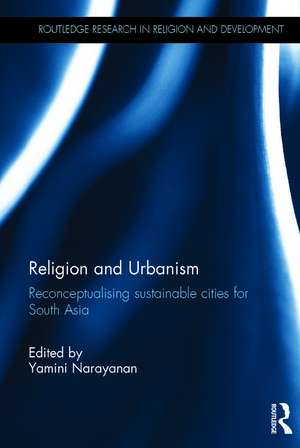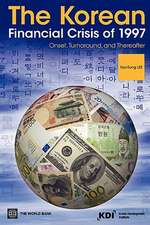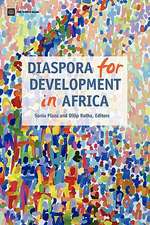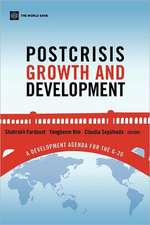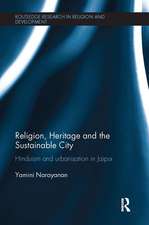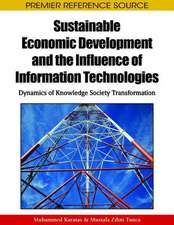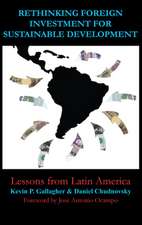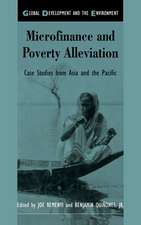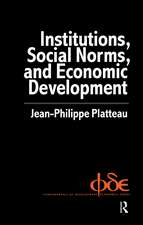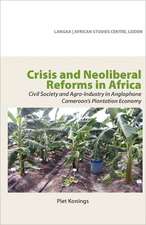Religion and Urbanism: Reconceptualising sustainable cities for South Asia: Routledge Research in Religion and Development
Editat de Yamini Narayananen Limba Engleză Hardback – 26 noi 2015
Religion and Urbanism contributes to an expanded understanding of 'sustainable cities' in South Asia by demonstrating the multiple, and often conflicting ways in which religion enables or challenges socially equitable and ecologically sustainable urbanisation in the region. In particular, this collection focuses on two aspects that must inform the sustainable cities discourse in South Asia: the intersections of religion and urban heritage, and religion and various aspects of informality.
This book makes a much-needed contribution to the nexus between religion and urban planning for researchers, postgraduate students and policy makers in Sustainable Development, Development Studies, Urban Studies, Religious Studies, Asian Studies, Heritage Studies and Urban and Religious Geography.
| Toate formatele și edițiile | Preț | Express |
|---|---|---|
| Paperback (1) | 416.22 lei 6-8 săpt. | |
| Taylor & Francis – 25 apr 2018 | 416.22 lei 6-8 săpt. | |
| Hardback (1) | 1056.80 lei 6-8 săpt. | |
| Taylor & Francis – 26 noi 2015 | 1056.80 lei 6-8 săpt. |
Din seria Routledge Research in Religion and Development
-
 Preț: 326.49 lei
Preț: 326.49 lei - 16%
 Preț: 274.46 lei
Preț: 274.46 lei - 18%
 Preț: 272.50 lei
Preț: 272.50 lei -
 Preț: 416.22 lei
Preț: 416.22 lei -
 Preț: 449.41 lei
Preț: 449.41 lei - 18%
 Preț: 997.90 lei
Preț: 997.90 lei - 19%
 Preț: 270.82 lei
Preț: 270.82 lei -
 Preț: 356.44 lei
Preț: 356.44 lei -
 Preț: 380.25 lei
Preț: 380.25 lei - 18%
 Preț: 1009.91 lei
Preț: 1009.91 lei -
 Preț: 391.61 lei
Preț: 391.61 lei -
 Preț: 382.36 lei
Preț: 382.36 lei -
 Preț: 186.32 lei
Preț: 186.32 lei -
 Preț: 385.62 lei
Preț: 385.62 lei -
 Preț: 186.36 lei
Preț: 186.36 lei -
 Preț: 387.20 lei
Preț: 387.20 lei -
 Preț: 198.45 lei
Preț: 198.45 lei -
 Preț: 389.66 lei
Preț: 389.66 lei -
 Preț: 386.22 lei
Preț: 386.22 lei -
 Preț: 172.00 lei
Preț: 172.00 lei -
 Preț: 384.86 lei
Preț: 384.86 lei - 18%
 Preț: 945.36 lei
Preț: 945.36 lei - 18%
 Preț: 999.51 lei
Preț: 999.51 lei - 18%
 Preț: 1059.62 lei
Preț: 1059.62 lei
Preț: 1056.80 lei
Preț vechi: 1288.79 lei
-18% Nou
Puncte Express: 1585
Preț estimativ în valută:
202.25€ • 210.37$ • 166.96£
202.25€ • 210.37$ • 166.96£
Carte tipărită la comandă
Livrare economică 15-29 aprilie
Preluare comenzi: 021 569.72.76
Specificații
ISBN-13: 9780415745208
ISBN-10: 0415745209
Pagini: 236
Ilustrații: 27 black & white illustrations, 1 black & white tables, 22 black & white halftones, 4 black & white line drawings
Dimensiuni: 156 x 234 x 14 mm
Greutate: 0.51 kg
Ediția:1
Editura: Taylor & Francis
Colecția Routledge
Seria Routledge Research in Religion and Development
Locul publicării:Oxford, United Kingdom
ISBN-10: 0415745209
Pagini: 236
Ilustrații: 27 black & white illustrations, 1 black & white tables, 22 black & white halftones, 4 black & white line drawings
Dimensiuni: 156 x 234 x 14 mm
Greutate: 0.51 kg
Ediția:1
Editura: Taylor & Francis
Colecția Routledge
Seria Routledge Research in Religion and Development
Locul publicării:Oxford, United Kingdom
Public țintă
PostgraduateCuprins
1. Religion, Urbanism and Sustainable Cities in South Asia Part I: Urban history, religion and heritage 2. Origins of Buddhist Nationalism in Myanmar/Burma? An urban history of religious space, social integration and marginalisation in colonial Rangoon after 1852 3. Religious Heritage in the Old City of Kabul 4. Revisiting planning for Indian Cities: the pilgrim city of Amritsar 5. Tradition versus urban public bureaucracy? Reshaping pilgrimage routes and religious heritage around contested space 6. Recognising the Spatial and Territorial Nature of Religious Communities in Colombo, Sri Lanka Part II: Informality, marginalisation and violent exchange 7. Religious structures on traffic lanes: Production of informality in New Delhi 8. Animals and urban informality in sacred spaces: Bull-calf trafficking in Simhachalam Temple, Visakhapatnam 9. Karachi - A Case Study in Religious and Ethnic Extremism: Implications for Urban Sustainability Part III: Reflections 10. Including Religion as well as Gender in Indian Urban Planning Policy: with reference to Lessons from the UK 11. Religion and Urban Policy for South Asia: Where Next?
Recenzii
"This pioneering anthology further paves the path for a deeper understanding of ‘religion-urbanism-heritage’ reciprocity and interaction, illustrated with several case studies from South Asia that emphasise the distinct role of religion in urban development and the making of historical cities. This collection will help scholars, planners and administrators in making urban policies more rational and viable." – Rana P.B. Singh, Professor of Cultural Geography and Heritage Studies, Banaras Hindu University, India
"This is an interesting and original treatment of the relations between religion, space and heritage in South Asia. It brings sustainability into the forefront of interdisciplinary scholarship and focuses on connections between urban planning and important belief systems that are still not well understood." – Michael Redclift, Emeritus Professor of International Environmental Policy, King's College
"These deeply researched essays grow from the idea that the religious needs of cities have been overlooked by scholars and planners, as have the contributions that religious belief and practice make to urban life. Dealing with urban questions in Afghanistan, Pakistan, India and Sri Lanka, this book offer readers new perspectives on the ways in which religious practice have helped to shape twenty-first century cities. The writers argue that sustainable, tolerable futures for South Asian cities will only result from processes that take account of the daily reality of religious belief and custom." – Robin Jeffrey, Visiting Research Professor, Institute of South Asian Studies, National University of Singapore
"This book shows that religion has made a structuring impact over the city in South Asia. Not only because shrines and processions give it a sacred flavor - bringing devotees of different denominations together, sometimes -, but also because ethno-religious nationalisms have all crystallized in an urban space and because communal riots have been an urban speciality. Besides, ghettoization among sectarian lines is much more pronounced in urban settings than in the rural context. This multifaceted book explores all these topics in depth." –Christophe Jaffrelot, Professor of Indian Politics and Sociology, King's College London
"This is an interesting and original treatment of the relations between religion, space and heritage in South Asia. It brings sustainability into the forefront of interdisciplinary scholarship and focuses on connections between urban planning and important belief systems that are still not well understood." – Michael Redclift, Emeritus Professor of International Environmental Policy, King's College
"These deeply researched essays grow from the idea that the religious needs of cities have been overlooked by scholars and planners, as have the contributions that religious belief and practice make to urban life. Dealing with urban questions in Afghanistan, Pakistan, India and Sri Lanka, this book offer readers new perspectives on the ways in which religious practice have helped to shape twenty-first century cities. The writers argue that sustainable, tolerable futures for South Asian cities will only result from processes that take account of the daily reality of religious belief and custom." – Robin Jeffrey, Visiting Research Professor, Institute of South Asian Studies, National University of Singapore
"This book shows that religion has made a structuring impact over the city in South Asia. Not only because shrines and processions give it a sacred flavor - bringing devotees of different denominations together, sometimes -, but also because ethno-religious nationalisms have all crystallized in an urban space and because communal riots have been an urban speciality. Besides, ghettoization among sectarian lines is much more pronounced in urban settings than in the rural context. This multifaceted book explores all these topics in depth." –Christophe Jaffrelot, Professor of Indian Politics and Sociology, King's College London
Descriere
Religion and Urbanism contributes to an expanded understanding of the notion of 'sustainable cities' in the context of South Asia by demonstrating that religion exerts a significant influence on the nature of urban development in the region. The book argues that the multiple, often conflicting and complicated ways in which religion or the multiplicity of religions enable or challenge socially equitable and ecologically sustainable urbanisation must thus be considered in analyses of 'sustainable urban development' of the region.
